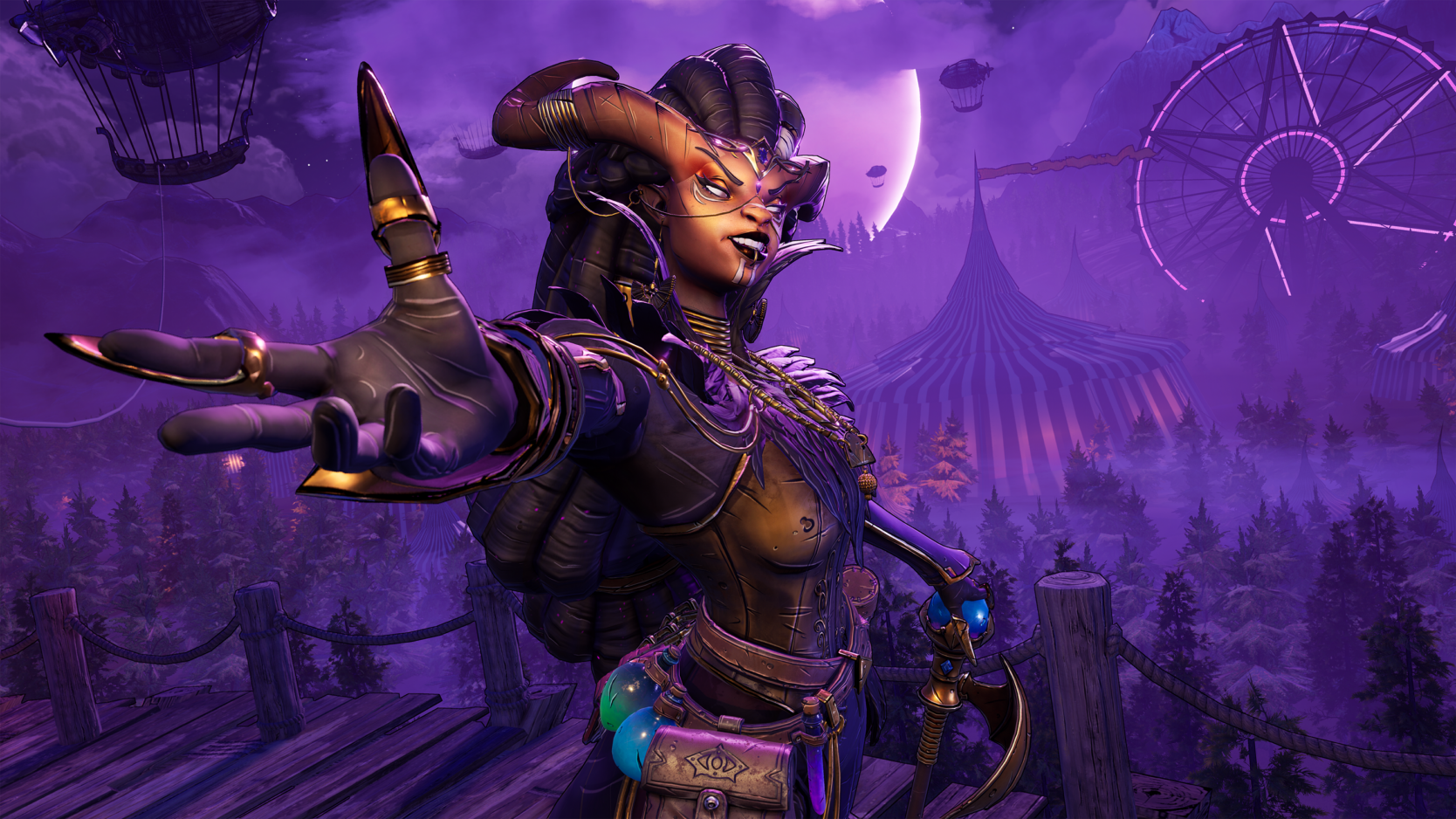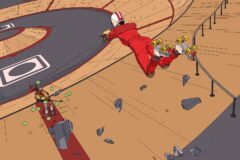While Tiny Tina’s Wonderlands may not be exactly like the Borderlands games that Gearbox Software fans have come to know and love over the last 13 years, the latest title in the franchise fuses aspects of what Borderlands fans appreciate most — like the humor, the characters and the sweet, sweet loot — into a genre the games haven’t yet explored: high fantasy.
Taking place as a tabletop RPG narrated by the frenzied mind of everyone’s favorite explosives-loving 13-year-old girl, Tiny Tina, Wonderlands brings magic, knights, and the whole fantasy shabang to Borderlands’ signature gameplay and style. The game expands upon the fan-favorite Tiny Tina’s Assault on Dragon Keep DLC from Borderlands 2 (which was later turned into a standalone title in preparation for Wonderlands), and is every bit as magically chaotic as one would expect.
In anticipation of the game’s release this Friday, SPIN spoke with Gearbox’s Audio Director Mark Petty and Creative Director Matt Cox via Zoom to chat about the upcoming title and how Wonderlands fits into the Borderlands universe.
SPIN: What was the creative process like for the sound design on Tiny Tina’s Wonderlands?
Mark Petty: One of the things we looked for at the beginning of Wonderlands was basically how to carry the sci-fi world of Borderlands and shift that focus into the descriptive words for Wonderlands — which had to do with magic and fantasy. We started digging into references that we thought were inspiring and appropriate. We looked at series like Harry Potter and the way they treated their spellcasting, their magic, their environments and the way the music sat in those environments. We started forming descriptive words for the audio, like “pillowy” and rd“wispy,” and we started looking at how to approach that from a sound design perspective. One of the things we realized was that a lot of the sounds were very grounded in organics. The layers were recorded in the real world, and they felt familiar, even though it was a fantasy presentation. For example, a mage doing a big spell cast with a whirling staff could have organic layers like stretching packing tape to get the electricity and spraying fences with pressure washers to get the whoosh. For cryo spells, we were freezing jeans in water and then bending those to get the crack of the ice, or crushing egg shells, or Pop Rocks in a container — all sorts of inventive things.
Did you have to be more inventive because you were working from home during the pandemic?
Petty: It was all a great experiment, and I think what fueled some of those approaches was the fact that we were living in a work-from-home environment. We didn’t have access to our full stage and control rooms and all of that stuff. This is literally sound designers at home finding things around the house and figuring out clever, inventive and creative ways to blend this audio to make it more magical and sci-fi. After a lot of the organics were compiled, we got into synth layers and patches that we had built to augment the organic recordings. One of the things that was a challenge was bringing bullet-firing weapons into the game, which you typically don’t see in a fantasy game. We wanted them to have connective tissue to the universe and the other things that were going on around you, whether that be environmentally or just the magic itself.
There are some long-time fans of the Borderlands franchise who are very excited to jump into this different world, so what should they expect from Wonderlands?
Matt Cox: From the game design side, we wanted to dive headfirst into magic and what that feels like in combat. I think people who have played our games before are going to notice right away is that even though we embraced guns and threw them into this fantasy world, you’re going to be casting spells and using melee weapons a lot — like you would expect in a fantasy world. You’re going to be using these other combat options more than you would in previous games. You’re going to be using synergies between guns, spells and melee a lot more — and there are a lot of different combinations you can use. Also, we don’t have pre-made characters, so you get to express yourself how you want both with all of the typical things you would expect in a normal character customizer and by choosing your voice and personality — and that’s completely separate from choosing one of our six classes.
How much emphasis went into making Wonderlands an entirely new experience as opposed to keeping what people already know and love from Borderlands?
Cox: From my perspective, it was very critical that folks who have never played a Borderlands game in their lives would never feel out of place or lost. It’s a brand new story with brand new characters and a brand new way to play. I think just by the very nature of being in the fantasy genre, it’ll appeal to a different subset of the world than sci-fi. We’ve heard from a lot of people who have pre-ordered this game or heard of the game that have never played a Borderlands game, but this particular style is attractive to them. On the flip side, we are known for pioneering this particular looter-shooter, fast-paced combat, tight combat loop, so we built off of that. People who love our types of games are going to be able to jump in, feel right at home and experience a lot of new things.
Petty: We didn’t really look at it from how we can cross-pollinate or help people make a transition. Wonderlands is its own thing. It’s really not about callbacks. It’s about being able to walk into the game and have a fresh experience. You don’t have to know anything about the franchise itself to have a great time. Even if you don’t know who Tiny Tina is, she’s just a crazy 13 year old who has all sorts of ideas and is super funny and super creative. Not to say that there aren’t winks, nods and Borderlands cameos that fans will definitely appreciate.
From a world-building perspective, people obviously really enjoy the Borderlands universe and the personality and humor within it. How did you take that into consideration when building Wonderlands as kind of its own world within the Borderlands universe?
Petty: One of the approaches that we decided early on was that we wanted music to do more heavy lifting when it came to world building and the feel of the environments. In the past, we’ve relied a lot on supporting actions and things that happen in the world as a catalyst for making the world feel more alive. We do that to an extent with Wonderlands, but at the same time, you really have the drones and cymbal swells and the various musical sound design elements themselves that feel like they’re part of the world. Sometimes, it’s hard to separate what actually is a thing in the world making a sound versus the music just being a part of the environment. We wanted to lean into that, because you can never understand exactly what the player is going to do and where they’re going to go. I wanted to make sure that the experience for them was consistent as they were traversing and moving through combat and discovery. They’re hearing these tones and darkness and things that represent the visuals colors — like dark magic purples and lush green jungle environments, those kinds of things — and understanding the feeling behind them instead of the literal interpretation.
Cox: Even though we’re in the Borderlands universe, it’s really just Tina that’s in the Borderlands universe, and our whole game exists inside her brain. That gives us a lot of license to push boundaries and not necessarily play by the rules of the Borderlands universe. I think one of the biggest opportunities that we have at Gearbox is that we’re one of the few in this space that really writes comedy. Comedy is a difficult thing to do, but it’s something that we’re very, very passionate about. Humor is a pillar of our Borderlands games, so that’s something that we wanted to honor wholeheartedly with Wonderlands. Of course, the whole game is being narrated by a chaotic 13-year-old girl, Tiny Tina, and she’s such a pillar of what our brand of comedy can be. That comedy was one of the biggest things that we wanted to make sure we honored. When you’re a developer and you’re doing a playthrough and supposed to be taking notes, but you forget to take notes because you get so into the game that you’re like “Crap! Now I have to go back and play all of that again!” There’s a certain level of excitement around the fact that you can be instilled in something for such a long time, and still find so much pleasure in it. Generally, if we feel that way, then it’s probably going to be well-received from folks who haven’t played it at all. I’m still laughing at jokes I’ve heard 1,000 times. because I’m just having a great time playing the game.





